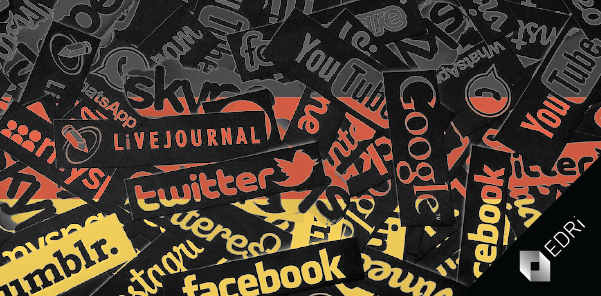EU action needed: German NetzDG draft threatens freedom of expression
On 22 May 2017 six civil society and industry associations sent an open letter to eight EU Commissioners asking to take action against the German bill on “Enforcement on Social Networks”, the “NetzDG”.
This bill asks social media companies to take down content, including perfectly legal material, that social media companies like Facebook can arbitrarily label as “hate speech”, “fake news”, “pornographic content”, among other categories. In addition, the draft law de facto imposes filtering of content, despite the fact that such technology cannot understand context and will, therefore, inevitably lead to still more legal content being deleted. The basic aim of the bill is, of course, well-intentioned. However, the way this bill is drafted appoints social media companies as arbiters of legality and “the truth”. Furthermore, this bill breaches EU law, which establishes that all restrictions to fundamental rights, including freedom of expression, must be provided for by law, necessary and proportionate (Article 52 of the Charter of Fundamental Rights of the European Union). In addition, EU law also prohibits imposing general monitoring obligations on companies. If adopted, this unprecedented law would serve as a bad example for other states, including countries with serious democratic deficits.
In its role as the “Guardian of the Treaties”, the European Commission has the duty to ensure the draft law is compatible with EU law, including the EU Charter of Fundamental Rights. The letter explains that this “would translate into at least responding to Germany with a detailed opinion expressing incompatibility with EU law under the ongoing notification process“. EU Commissioners took a “solemn oath” not to be influenced (“either to seek nor to take instructions from any Government or from any other institution”) by Member States in exercising their duties.
This letter adds to previous criticism expressed by EDRi and leading experts, such as Professor Wolfgang Schulz. The letter is still open for signatories in the coming days. You can read the letter below or here (PDF).
Dear President Juncker,
dear First Vice-President Timmermans,
dear High Representative Mogherini,
dear Vice-President Ansip,
dear Vice-President Katainen,
dear Commissioner Bieńkowska,
dear Commissioner Jourová,
dear Commissioner Oettinger,
The signatories to this letter represent civil and human rights organisations as well as industry bodies representing the Internet technology sector. We are writing to call on the Commission to ensure compliance of Germany’s draft Network Enforcement Law (as notified on 27 March 2017) with EU law, including the EU Charter of Fundamental Rights.
While no one would object to the aim of curbing illegal hate speech and other unlawful content online, the draft law would unquestionably undermine freedom of expression and information. In practice, a distinction between content that is ‘manifestly’ unlawful and not manifestly unlawful is only very difficult to make. The legality of individual statements must always be assessed in its specific context. This, coupled with very tight time limits (24 hours or 7 days) for takedowns and draconian sanctions, will strongly incentivise online companies to simply take reported content down, thereby chilling freedom of speech online.
Beyond that, the draft law also requires social networks to immediately remove or block any copies of the unlawful content that are located on the platform. This obligation would, in practice, necessitate content filters searching the whole platform to automatically take down content in a fully undifferentiated manner. Automatically identified content, which is used in a totally different context, e.g. a parody, would be taken down because filters are ‘blind’ to contextual circumstances. We would like to stress that these kind of content filters would be unprecedented in a free democracy — so far only a handful of countries with serious democratic deficits require similar systems.
With respect to the above, we also see grave conflicts with established EU law. In various cases the European Courts stressed that measures put in place to protect a public interest, including the protection of a fundamental right, must strike an appropriate balance with other fundamental rights. We do not see how a proposal that profoundly undermines freedom of expression would pass that test.
Furthermore, the law’s content filtering requirement runs counter to EU law that protects fundamental rights by prohibiting general monitoring obligations.
In addition, the draft law will also have negative economic implications for the EU. The German draft law is a national measure which will lead to far greater regulatory fragmentation and runs against the Commission’s policy agenda as well as the spirit of a Digital Single Market. That is particularly obvious with respect to the obligation to store removed content within the Federal Republic.
On the basis of our concerns, we call on the Commission to live up to its role of guardian of the Treaties and make sure national rules are compliant with EU law and case law. In concrete terms, this would translate into at least responding to Germany with a detailed opinion expressing incompatibility with EU law under the ongoing notification process.
We would like to thank you for your time and attention.
With kind regards,
James Waterworth, Vice-President, CCIA Europe
Siada El Ramly, Director General, EDiMA
Joe McNamee, Executive Director, EDRi
Fanny Hidvégi, European Policy Manager, Access Now
TJ McYntyre, Chair, Digital Rights Ireland
Jens-Henrik Jeppesen, Director, Center for Democracy and Technology


